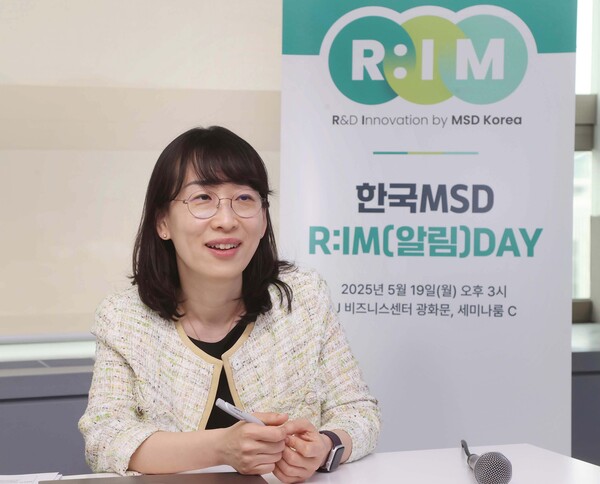MSD Korea is expanding its leadership in global clinical research through an aggressive push into local partnerships and strategic investment, positioning Korea as a pivotal hub in the company’s global R&D framework.

At a Monday symposium titled “A new paradigm in the pharmaceutical industry: Global clinical trends and MSD’s vision," MSD Korea Clinical Research Executive Director Lee Hyun-joo unveiled key data underscoring its commitment to Korea’s research ecosystem.
Some data showed that the company recorded the highest number of clinical trial approvals in the country last year, with 36 trials cleared by the Ministry of Food and Drug Safety (MFDS) -- surpassing AstraZeneca Korea (22 trials), Addpharma (19), AbbVie Korea (17), and Boryung (15).
“This achievement also marks the fourth consecutive year that MSD Korea has invested more than 70 billion won ($50 million) annually in local clinical research, with total investment now exceeding 290 billion won,” Lee said. “These efforts not only reinforce MSD's long-term vision for Korea as a cornerstone of its global drug development pipeline but also demonstrate the country’s growing role in advanced oncology research.”
According to Lee, the company is prioritizing partnerships with local academic institutions and hospitals to ensure that investigational therapies are proven effective and safe specifically for Korean patients.
MSD is conducting over 180 clinical trials across 640 research sites in Korea, with 161 studies focused on oncology.
Despite Korean institutions representing only 3 percent (518 sites) of the total 14,770 global cancer clinical trial sites, they are responsible for a striking 73 percent of MSD’s ongoing global oncology trials, Lee said. This includes leading hospitals such as Seoul National University Hospital, Samsung Medical Center, Asan Medical Center, and Severance Hospital, which serve as top-tier trial sites within MSD’s global network.
Notably, Korea ranked fourth globally in MSD’s oncology trial patient enrollment -- trailing only the U.S., China, and Japan -- highlighting the country’s vital contribution to global cancer research.
Lee emphasized that Korea’s strong institutional infrastructure and deep clinical expertise have allowed it to maintain momentum even amid prolonged disruptions in the healthcare system.
In parallel with trial volume growth, MSD is pursuing next-generation clinical designs.
The company is integrating advanced digital tools and artificial intelligence (AI) into its early-stage research, aiming to enhance predictive capabilities and streamline protocol design.
Adaptive trials, umbrella protocols, and basket designs are increasingly common in MSD’s portfolio, reflecting a broader industry shift toward more flexible and efficient trial models.
“MSD has developed proprietary AI tools to better assess the safety and efficacy of pipeline candidates during the preclinical stage,” Lee said. “We are accelerating diversification of the pipeline by incorporating AI and machine learning across the discovery-to-development continuum.”
The company’s long-term strategy includes establishing Korea as a gateway for Korean biotech firms to participate in global research networks.
MSD Korea has ongoing partnerships with nearly 20 local biotech and pharma companies, including recent agreements with Samsung Biologics, Alteogen, ABL Bio, GI Innovation, and Hanmi Pharmaceutical.
Many of these collaborations involve the blockbuster PD-1 inhibitor Keytruda (pembrolizumab) in combination regimens, which Lee described as playing a “key synergistic role” in Korean industry trials.
Despite the success, Lee acknowledged the need for continued evolution for Korea’s clinical trial sector, particularly in adopting decentralized clinical trial (DCT) models.
She pointed out that while Korea’s infrastructure remains strong, the country lags behind others in implementing flexible, patient-centric trial systems.
“Other countries are rapidly introducing new frameworks and infrastructure for decentralized trials. Korea needs to prepare more agile systems that can be deployed quickly -- especially in case of future global disruptions like pandemics,” she cautioned.
To sustain its role as a preferred global research partner, MSD Korea is advocating for policy reforms, regulatory agility, and deeper public-private collaboration.
“For Korea to truly become a central hub of pharmaceutical innovation, government, academia, and industry must work closely to build a sustainable and trusted R&D ecosystem,” Lee concluded.
Related articles
- [BIO KOREA 2025] MSD bets big on Korean biotech for open innovation
- MSD promotes Vaxneuvance ahead of showdown with Pfizer’s Prevnar20 in Korea’s vaccine market
- MSD’s Welireg fails reimbursement review again, while Ledaga Gel and Omjjara secure insurance coverage
- MSD and CellBion launch Korea’s 1st radioligand-immunotherapy trial for prostate cancer
- MSD Korea exec appointed as commercial strategy & operations director for MSD ANZ
- MSD launches phase 3 Keytruda combo trial in tough-to-treat endometrial cancer in Korea
- MSD Korea wins coverage boost for transplant infection drug Prevymis
- Daiichi lines up subcutaneous Enhertu trial with Alteogen as Keytruda shot nears launch
- Viatris Korea signs exclusive distribution deal with MSD Korea for anesthesia reversal drug Bridion

